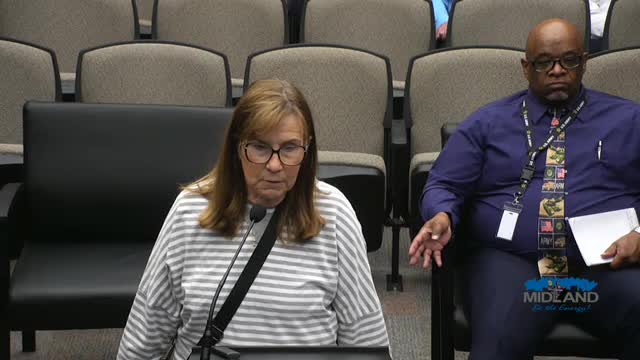Midland officials outline fixes and new safeguards after early-year water supply strain
Get AI-powered insights, summaries, and transcripts
Subscribe
Summary
City staff described how emergency bypasses, valve inspections, satellite leak detection and partnership treatment reduced near-term risk and formed a multi-year plan to strengthen Midland's water supply.
City of Midland public works officials told the City Council on Oct. 28 that a combination of temporary bypasses, targeted repairs and new monitoring programs prevented a water-supply emergency earlier this year and are now being formalized into longer-term resilience projects.
Public Works Officer Carl Crago said the city’s supply capacity had been cut earlier in the year when both a critical valve at the T‑Bar facility failed and treatment-plant operations were reduced by contractor errors and zebra‑mussel maintenance. “We provided a temporary bypass at the plant to bring that plant up from 8,000,000 gallons a day to 60,000,000 gallons a day, and then within a week, 24,000,000 gallons a day,” Crago said. He told council the failed T‑Bar valve has been repaired and that other critical valves across the system are being inspected and upgraded.
The after-action review led staff to several near- and longer-term steps, Crago said: implement inspections for critical valves, extend SCADA monitoring to key components, pursue bypass routes to feed treated water directly to the city’s clear wells and to large ground‑storage tanks, and expand satellite leak-detection and pressure‑monitor programs to find and address hidden losses. Crago noted the utility has installed 64 active pressure monitors since April and that a satellite leak-detection contractor has identified roughly 30 main leaks that city crews have repaired.
Why it matters: officials said these measures reduced the risk of a citywide boil-water notice during the February–March disruption and will help manage both routine system degradation and unexpected incidents. Crago also outlined planning work toward supplementing supplies over the coming decades, including upgrades at the Paul Davis site and options to add treated groundwater capacity.
Council members praised the utility work. One member noted that valve maintenance had been highlighted as a priority during the council retreat and that the recent inspection and replacement program showed early returns. Crago told council the city had seen a 56% drop in water-related work orders year over year after rolling out the leak-detection, main‑replacement and valve programs.
Staff are advancing designs for the bypass projects and continuing coordination with regional partners on treatment for zebra mussels and other contaminants. Crago said additional system investments will be guided by those projects and by expected results from ongoing monitoring.
